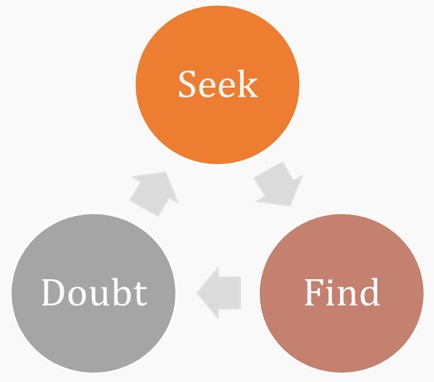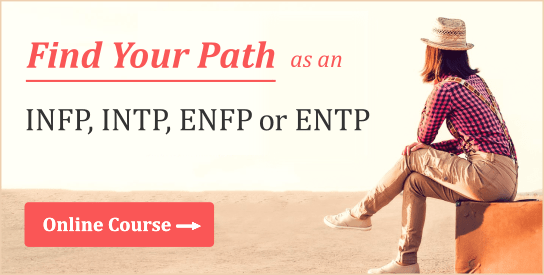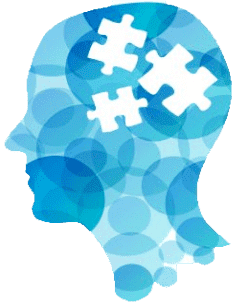
A hallmark feature of being an NP type (i.e., INFP, INTP, ENFP, ENTP) is struggling with doubt and indecision. Doubt can pervade and disrupt any aspect of their lives, be it their careers, relationships, worldview, or identity. For some NPs, this propensity can be debilitating, engendering a sense of aimlessness, paralysis, or even nihilism.
Since intuitive types are less common and less conventional than their sensing counterparts, NPs often feel they have something unique and important to contribute to the world. However, their doubting nature may disrupt even their most earnest attempts to galvanize their identity and purpose. While NPs may enjoy zeniths of enthusiasm—feeling they’ve finally found THE solution—it is usually only a matter of time before they start questioning again and uncertainty regains the upper hand. This can be a frustrating and discouraging rollercoaster ride for NPs, since it feels like whatever they start will eventually be erased by tidal waves of doubt.
For many NPs, doubt goes hand-in-hand with being a seeker. The cycle goes something like this:

It’s not that NPs don’t enjoy functioning as seekers. In fact, most prefer to engage with the world in an open-ended, explorational fashion. However, NPs also feel that their explorations should ultimately lead somewhere or produce something tangible. In the parlance of type, this can be understood as the P seeker pursuing a sense of completeness in the form of a J solution / destination, or as the intuitive type striving to materialize (S) her N vision.
Time can be one of the NP seeker’s greatest adversaries. If life wasn’t so short, perpetual doubt or indecision would probably seem less distressing. But because life is full of deadlines—whether biological, cultural, or self-imposed—NPs must find ways of dealing with their doubt and indecision.
Knowledge-Seeking
One doubt-combatting strategy commonly employed by NPs is knowledge-seeking. The idea here is that more information equals more clarity and more certainty. This is the predominant approach used by the Enneagram Type 5, many of whom are INTP, INTJ, or possibly ENTP types. While Fives hope to eventually do something with their storehouse of knowledge, in the meantime, they feel they must continue to study and learn in order to achieve the requisite competence and confidence for action.
NPs may also combat doubt by acquiring self-knowledge. The quest for self-knowledge takes center stage in the Enneagram Type 4, many of whom are INFP, INFJ, or possibly ENFP types. Fours believe that clarifying their identity and self-understanding, and then authentically expressing that understanding creatively or relationally, represents the key to their happiness. As I observed in my post on INTP and INFP identity-seekers:
Little is more intriguing to identity-seekers than examining the nature of their own self, of trying to get to the root of who they are. They are constantly “checking in with themselves,” interpreting and relating their experiences to their current self-understanding.
Welcoming Distractions
NPs are notorious and at times criticized for their distractibility. In many respects, distractibility—noticing and responding to novel external stimuli—is part and parcel of being a P type.
Although distractibility, especially when pronounced (e.g., ADD), can certainly thwart productivity, NPs generally seem to appreciate distractions. Not only do distractions represent a welcomed source of novelty, but they can also temporarily alleviate life’s burdens, including the weight of figuring out what to do with their lives.
The Enneagram 7, heavily populated by ENTPs, ENFPs, and ESPs, can be associated with distractibility. Sevens are constantly looking out for new adventures and possibilities. Highly spontaneous and adaptable, they readily pursue distractions perceived to make their lives more exciting, intense, or interesting.
Diving In
Although ENPs may lack some measure of self-discipline or self-motivation, as extraverts, they are more inclined to take risks and put themselves out there than INPs may be. Not only does this furnish them with opportunities to discover what they enjoy, but also to garner feedback from others regarding their personal strengths and weaknesses. Moreover, it can reveal new possibilities that would be unknowable through reflection alone. As a result of their willingness to dive headlong into life, doubt and uncertainty may be less chronic or debilitating for ENPs than for their INP counterparts.
Rather than plunging themselves into the world, INPs are more inclined to experiment with things in an inward or solitary manner. They are usually more cautious, reflective, and risk-averse than ENPs. That being said, INPs often discover that experimenting with or honing a craft not only gives them a sense of purpose, but also offers them relief, even if temporary, from their doubts and concerns. As observed by Don Riso and Russ Hudson in their book, Personality Type:
The tension between self-awareness and self-consciousness can be resolved in creativity. In the creative moment, emotions can be harnessed without getting lost in them…In the moment of inspiration, we are paradoxically most ourselves and most liberated from ourselves.
Here, Riso and Hudson highlight the fact that, during periods of creative immersion, concerns about the self essentially disappear. Moreover, because the powers of the self are harnessed and integrated in the creative act, the self is not really lost (though it may seem to be) but actualized; thus, the notion of being “most ourselves.”
Final Remarks
Doubt is a regular feature of the NP mind. It derives from the same mental architecture as openness and creativity, which is why open individuals are often slow to draw firm conclusions. Especially when combined with excessive rumination or analysis, openness supplies the perfect conditions for doubt to take root and grow.
Of course, there are different degrees, levels, and objects of doubt. It is therefore not unusual for NPs to feel quite strongly about some things and ambivalent toward others. For instance, an INFP mother may never waver in her love and commitment to her children, while simultaneously exhibiting chronic restlessness and uncertainty in her career life. So even though NPs can be roughly characterized as doubters, there are some things they will invariably know or feel with certainty.
The problem of doubt is apt to feel most salient when it prevents NPs from securing something they really want or prevents them from achieving important goals. For everything else, they may think of it differently or perhaps even give it a different name (e.g., skepticism, open-mindedness, curiosity, etc.).
While there is no singular strategy or solution for ameliorating NPs’ doubt-related issues, part of the solution involves accepting doubt as part of who they are and recognizing its potential upsides. Distractions, knowledge-seeking, and a willingness to act / create in spite of incomplete knowledge are also viable strategies for navigating life as an NP type.
If you’re an NP type and would like to better understand your personality, life purpose, career path and more, we encourage you to explore our new online course, Finding Your Path as an INFP, INTP, ENFP or ENTP:


Michael Yakimoff says
Another wonderful and insightful post, thank you A.J, you have nailed me as an INP.
And to think I once believed I was a one-in-so-many-billion unique human being — but the truth is I am not — and type theory surely proves this so.
Aset says
This was really good! As an ENFP it makes so much sense. I always thought I was flaky due to the finding the answer or direction, feeling confident about it and then in time doubting. I try to get myself moving the direction I want to go in, collect knowledge, then apply that to my self-awareness, then just do it. I’ve missed the mark A LOT but always find the inner strength to keep going until I hit the right one. Thanks for letting me know I am not a flake, but both a risk taker and cautious.
Razaz says
Interesting post.
I am INFP Eneagram 4w3. Have almost all the symptoms of paralysis pointed out in the article. But, for better or for worse, my goal-oriented 3 wing had kept pushing me forward, so now I am kind of highly successful in my highly doubted field :(
Mel says
Very insightful and I resonate with this theme of doubt as an IP.
Ulysses says
I relate to this very much. I am cautious but experimental at the same time, more so with having a judging function followed by Ne. I love this site as it has clarified many things. The idea of the NF temperament has never done it for me, I can relate to ENFPs (having the same functions in a slightly different order and all), but INFJs and ENFJs seem to be from another planet. It’s much easier to pertain to the other IXXPs.